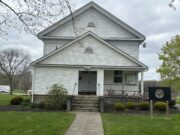Mantua – At the last meeting Crestwood School District Treasurer Sarah Palm reviewed district financial forecasts and reviewed potential levy options with board members. She noted the district’s current bond, permanent improvement and operating funds, which are funded through residents’ property tax assessments.
She noted that in 1976, Ohio legislature enacted property tax reform known as House Bill 920. Its purpose was to keep inflation from increasing voted taxes. When the voters approve a tax levy, they are agreeing to pay a certain amount of money for a specific purpose, over a given time period. In following years, as property values increase, House Bill 920 does not allow the school district to receive any additional revenue from this voted levy. In order for the school system to raise more revenue, it must go to the voters for approval of another levy.
In the latest 5-year forecast, which is available on the District website, Palm notes that in Fiscal Year 2020 a revenue surplus is expected. This means that projected revenues will exceed expenditures by $115,440. By the last year of the forecast in 2024 revenues are projected to be in a shortfall; expenditures are projected to be greater than the revenue by $2,252,524.00. Palm notes that the district would need to cut 10.8% of expenditures in order to balance the budget without additional revenue.
For reference, she also noted that the permanent improvement levy that was renewed in 2017 is set to expire in 2021; the Classroom Facilities and Bond Improvement will expire in 2022. Palm noted, “Although the forecast is much improved since May, Crestwood will still need to be on the ballot for new money starting in FY2022.”
She reviewed a variety of levy options for the Board, including emergency levies in a variety of valuations, earned income tax, and a hybrid levy. She noted that earned income is attractive to self-employed and senior citizens, and although less money is collected in the short term (6% the first year, 75% in 2nd year, with the full amount collected in year three) this could be a viable option due to the long-term benefits. She noted that the Crestwood School District has the second-lowest tax rate of Portage County School Districts, followed by Southeast as the lowest. Residents are encouraged to visit the Portage County Auditors website (http://portagecountyauditor.org/) tax estimator to calculate their current tax rate and estimated property value.
Board member Todd Monroe noted that previous boards “asked voters to pass a minimal amount, and then have to keep asking for more levies as time goes on.” He suggested that perhaps the new board can “break the cycle and plan ahead.”
Superintendent David Toth noted, “The district is at a crossroads,” and noted that long-term plans should also include a facility plan. He noted that declines in enrollment give the district enough space to allow for the closure of one building. He noted that the High School, built in 1954, would cost an estimated $17 million to update, while the Middle School, built in 1965, would cost an estimated $10 million. He suggested conducting focus groups to determine how voters would like to proceed with district facilities and potential levies since, “if the community isn’t behind it, we’re wasting our time.”
The next school board meeting will be held on Tuesday, February 25th at 7 pm at Crestwood Primary School.
















